-
THE GILDED CAGE (Ruben Alves 2013)
RUBEN ALVES: THE GILDED CAGE/LA CAGE DORÉE (2013)
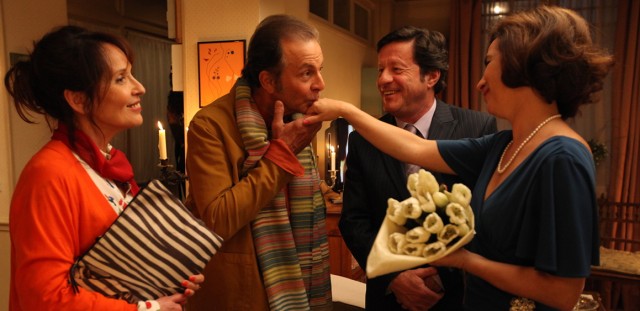
Chantal Lauby, Roland Giraud, Joaquim de Almeida, Rita Blanco
A comedy of class and nationality issues set in bourgeois Paris
The Gilded Cage/La cage dorée is a routine charmer that contains various ingredients older US arthouse audiences like. To begin with it states its movie-glossy view of its locale with romantically hazy panoramas of major Paris tourist landmarks. Its ground level focus is a nice middle-aged expatriate Portuguese couple, Maria and José Ribeiro, who have lived in Paris for some 35 years. Maria is the concierge of a posh Haussmannian building, another attractive locale, which provides her and José with a convenient if cramped ground floor apartment called the "loge." José is the foreman for a successful French building contractor. Both are indispensable to the French people they work for and serve. They begin to recognize how fulfilling and involving their roles are when news arrives of an inheritance from a family member back home involving houses and a farm producing port wine that provides an income of €200,000 a year. José, at least, has always wanted to return to a house in their native land. Here it is, and then some, an ancestral one, with a payoff. Essential condition for receiving this inheritance: the family must move back to Portugal.
The real issue is how José and Maria can resolve this conflict between their longtime ties in Paris -- intensified by the presence of their son Pedro (Alex Alves Pereira) and older daughter Paula (Barbara Cabrita), both of whom identify as essentially French -- and the rich inheritance and ideal conditions for returning home to Portugal. But instead of considering the issues involved in making a decision this serous and practical, in the manner, say, of a Jane Austen novel, Ruben Alves' film just jokes around about them for an hour or so.
The movie rushes all too eagerly to provide comic complications. Suddenly it emerges that Paula is romantically involved with the handsome Charles (Lannick Gautry), the son of José's boss Francis Caillaux (Roland Giraud) and ditsy wife Solange (Chantal Lauby).
Francis brings José to a fancy restaurant meal with entrepreneurs planning to build a shopping center and he's such a paragon of old-world craftsmanship and integrity the fat cats hire Francis on the spot to do the construction provided José's in charge. Francis also offers José a fat raise. And it turns out that the construction company has been on the skids of the past two years and if they can't take this job, which requires José's presence to sell, they're screwed. On the home front, the apartment building managers not only guarantee José and Maria can occupy the "loge" free of charge for a long time to come but will expand it, showing they're a lot nicer and more devoted to Maria than they may have seemed.
The status issues are driven home in an intentionally lighthearted but slightly gag-inducing manner when, to certify the union of Charles and Paula, their respective parents have a sit-down dinner at the "loge" full of embarrassing class comedy with Maria painfully trying to act posh and Solange Caillaux equally awkward in her straining to act down-home and her revealed ignorance of things Portuguese. The blurb's "sprawling cast of oddballs" is displayed throughout the film. Pedro in turns embarrasses himself by pretending to his lyçée girlfriend that his family is among the apartment building's rich occupants instead of mere caretakers.
La cage dorée has been nominated for a 2014 César for "best first film" and Ruben Allves has certainly delivered an able and fluent effort -- except that it is a mass of sit-com-like situations and clichés and offers nothing new. One might contrast Philippe Le Guay's recent period social comedy The Women on the Sixth Floor/Les Femmes du 6e étage about a rich financier (played by the impeccable Fabrice Lucchin) who discovers working class earthiness in 1962. This other treatment of Hispanics in Paris is quite conventional, meant only to amuse and warm the heart. But it still offers more solid matter than this fluffy effort -- which, while a bit thin on realistic detail, also isn't quite as hilarious and fun as it may intend.
La cage dorée, 90 mins, was released in Franch 24 April 2013. Critics were generally favorable, with the Allociné press rating a decent 3.5. Screened for this review as part of the Film Society of Lincoln Center-Unifrance joint 6-16 March 2014 series Rendez-Vous with French Cinema . R-V showings: Sunday, March 9, 9:30pm - WRT; Tuesday, March 11, 6:00pm – IFC; Saturday, March 15, 7:15pm - WRT.
Last edited by Chris Knipp; 01-02-2015 at 01:22 PM.
-
THE MARCHERS (Nabil Ben Yadir 2013)
NABIL BEN YADIR: THE MARCHERS /LA MARCHE (2013)

Grassroots political action in France
During the brief socialist presidency of François Mitterand and therefore a time of hope for leftists, it was known as "La Marche pour l'égalité et contre le racisme" (The March for Equality and Against Racism) and was nicknamed by the media "Marche des Beurs," using a slang word for French-born children of North African Arabs. But it was not just that, since according to this film, key members of the nine original marchers are non-Arabs, especially Claire (Charlotte Le Bon), a self-declared lesbian, Christophe Dubois (Olivier Gourmet), one of the leaders and anchors, and Sylvain (Vincent Rottiers), a young white unemployed man from the poor Minguette suburb outside Lyons, where the march begun in Marseilles got its inspiration. (Names have been changed; these are stand-ins for the originals.) The march took place from 15 October to 3 December 1983. It was the first national demonstration of its kind in France, part of a movement as much needed today as then, and largely forgotten. For director Nabil Ben Yadir clearly this is a labor of love for which he got fine support. The aim equally clearly is to entertain but also to edify and inform.
Two main demands the group formulates: a ten-year residency card and the right to vote for non-citizens. The group's conflicts about its stands are very nicely shown. All the rough edges are there.
The group goes to big cities, but while they are menaced by racists on the road, and one member is brutally disfigured, while another terrible attack takes place against a young Arab on a train, in the first town only one supporter shows up, if an enthusiastic one. But they gather numbers and get on the national news; bravely visit Dreux, a town where the ultra-right National Front had just gained electoral strengh; and when they get to Paris there is a real Paris-style march of well-wishers, 100,00 strong.
Ben Yadir does an excellent job at a task that's not so easy, dramatizing a group event that includes few dramatic events. But there is plenty of specific personal detail. It begins when charismatic young Mohamad (Tewfik Jallab) is gravely injured by a policeman. His friends want to attack the shooter, but the more useful response of non-violent action inspired by Gandhi and Martin Luther King is devised. Kheira (Lubna Azabal of Paradise Now, Incendies and Coriolanus), a tough, heavy-smoking French Arab political organizer, joins and becomes the group's voice, often provocative toward individual menbers but clear and eloquent when it's time to give a speech. A fat boy called Farid (M'Barek Belkouk), soft, obsessed by food, and not very willing to go on long walks at first, becomes a stalwart, and keeps a journal that will be one of the event's key records. Also featured is the popular Jamel Debbouze as oddball druggier marcher Hassan and Philippe Nahon as the grumpy but loyal driver of the backup van.
The march's romantic couple turns out to be Sylvain and Monia (Hafsia Herzi of Secret of the Grain) though in a late scene in the film Monia expresses doubt that their cross-cultural affair can endure. The strength of these two actors shows the depth of the casting here. The Marchers is involving, sometimes quite moving, even if it's a little long and the mise-en-scène is flat and the overall impression is of a TV movie that's way better done than you'd expect. It would have been nice to have follow up on the movement and the group, including snapshots showing the real people as they were then and are now.
The Marchers/La marche, 12- mins, Nabil Ben Yadir, France/Belgium, 2013, 120m. Released 27 November 2013 in France, the film got decent reviews (Allociné press rating: 3.4). Screened for this review as part of the Unifrance-Film Society of Lincoln Center 6-16 March 2014 series, Rendez-Vous with French Cinema. Schedule: Saturday, March 8, 9:45pm – IFC; Sunday, March 9, 1:30pm – WRT; Friday, March 14, 3:30pm - EBM
In Person: Nabil Ben Yadir
Last edited by Chris Knipp; 01-01-2015 at 07:53 PM.
-
MOOD INDIGO (Michel Gondry 2013)
MICHEL GONDRY: MOOD INDIGO/L’ÉCUME DES JOURS (2013)

ROMAIN DURIS, AUDREY TAUTOU, AND OMAR SY IN MOOD INDIGO
Overproduced surrealism
Romain Duris and Audrey Tautou, who were a cute screen couple as far back as 2002's L'Auberge Espagnole, are back again in this very oddball romance born out of marriage-made-in-heaven of novelist Boris Vian and filmmaker Michel Gondry. If you like stories in overproduced sub-Jeunet mode where every scene is replete with Rube Goldberg surrealist gadgetry, this is your movie. Otherwise, you are likely to get turned off during the first overwrought ten minutes, before the opening titles even have rolled. If surreal sequences of rows of moving typewriters and a piano that makes cocktails based on what tune's played on it float your boat, you'll find Gondry (technically anyway) in top form here, and since Vian is a writer much loved in France, this remarkable realization of his vision is particularly welcome with his local fans. Gondry's staging is rich and accomplished. It's just that it tends to overwhelm the narrative content in scene after scene.
Duris is a rich bachelor named Colin served by the big, beefy, toothy Intouchables costar Omar Sy, his accountant, major domo, and, by the way, his (at first) verbally over-polite manservant. Inspired by his best friend Chick's new American girlfriend, Colin finds Chloé (Tautou) and woos her. They marry. She becomes ill, and Colin, at first rich, goes broke because of the need to provide Chloë with an endless supply of flowers to keep her alive. I'm guessing that the novel may make a bit more use of best-friend Chick (Gad Elmaleh) than the film manages to.
Mood Indego/L'Écume des jours, 95 mins, opened in France 24 April 2013. It was nominated for three 2014 Césars -- Étienne Charry (Best Original Music), Florence Fontaine (Best Costume) and Stéphane Rozenbaum (Best Production Design). The French critical reception was mediocre: Allociné press rating: 3.0. Given Gondry's remarkable performance here and the love of Boris Vian, there were and will be admirers. But Le Monde's critic Thomas Sotinel spoke for many when he wrote, "The film exhausts all its energy in constructing a world that doesn't leave much room for its inhabitants." Or, as Variety's Boyd von Hoeij puts it, "the film frequently privileges art direction over emotion." Screened for this review as part of the Rendez-Vous with French Cinema (FSLC-Unifrance), 2014. Showings in the series:
Sunday, March 9, 7:00pm - WRT; Monday, March 10, 8:00pm – IFC; Monday, March 10, 9:30pm - BAM
In Person: Michel Gondry.
This film opens 18 July 2014 in New York at Landmark Sunshine, and in Los Angeles.
Last edited by Chris Knipp; 01-01-2015 at 01:07 PM.
-
LOVE BATTLES (Jacques Doillon 2013)
JACQUES DOILLON: LOVE BATTLES/MES SÉANCES DE LUTTE (2013)
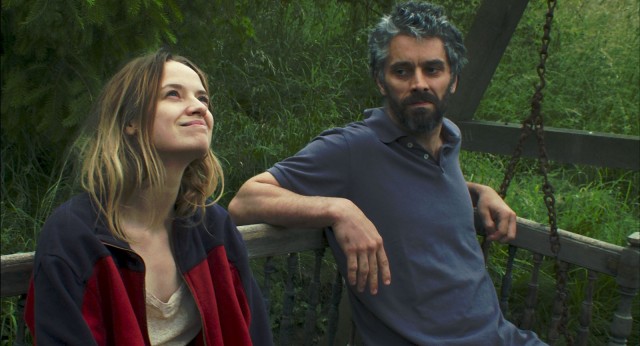
SARA FORESTIER, JAMES THIERRÉE IN LOVE BATTLES
Love smacks
On the one hand Jacque Doillon's latest is a remarkable tour de force, in physical terms. On the other hand it's barely more than teasing arthouse porn, a crude series of bump and grind sessions ending in sex as a couple decides they like S&M, or beating up on each other as a prelude to sex, anyway. This is basically a two-hander about a man and woman who can't decide if they want to fight or fuck. "She," a young country woman (Sara Forestier of The Names of Love) has lost her dad. "He" (James Thierrée, Chaplin grandson and circus acrobat) is temporary caretaker of a comfy nearby house. The pair have strong chemistry, having known each other since way back but never previously gotten it on. They do a lot of talking before the boffing starts. Then when it does, it varies only in location from scene to scene. It's outdoors and indoors, on the floor, on the kitchen table, on the stairway, in a mud puddle, and so on.
Personally, I prefer Jane Austen. If this is the modern age's version of the war between the sexes, I'll go back to Mansfield Park --or, for something French, Choderlos de Laclos. "He" and "She" are exploring sexual roles and emotional conflict in relation to eroticism, presumably. But it all seems halfway between utterly childish and utterly dysfunctional. At best, this pair needs couples therapy -- fast, before things turn outright abusive and dangerous. Unless, that is, this is just a game that goes no deeper and lasts no longer than the work of a filmmaker so glib his last movie came out just two months before this one.
Still, technically, the physical scenes are a bit unusual and seem even a bit risky (more than risqué), since it looks like the specific moves are not carefully planned and they might have hurt each other. Evidently the two performers are thoughtfully selected not just for looks but for both willingness and ability to carry out the fight-fuck transitions. Judging by her boarding a Metro train totally nude in Names of Love and other roles, such as her amour fou turn in Suzanne, Sara Forestier is a risk-taking, blithely over-the-top actress. She can hold one's attention, whatever she's doing. She is also small and light. Thiérrée, being a performance artist and acrobat as well and big and strong, is putatively capable of handling Forestier without hurting her -- though at one point late in the game he bangs her head against the wall three times. They look like they're doing damage to each other, but probably it was fairly safe. But this indeed reduces drama to performance art.
In between "She" has conversations with her sister (Louise Szpindel) at her late father's house and with a friend (Mahault Mollaret) on Skype and in person, but this dialogue is minimal and negligible, except perhaps for her helpfully telling her friend that she's madly in love with "Him" and wants nothing any more but to have sex with him. We might not have guessed. We might have thought she was prepping for kung fu class.
Love Battles/Mes séances de lutte, 99 mins., debuted at Berlin. Upon its 6 November 2013 French release it received generally favorable reviews (Doillon has a following in France) and the Allociné press rating was 3.5. Screened for this review as part of the Unifrance-Film Society of Lincoln Center 6-16 March 2014 series Rendez-Vous with French Cinema. Showings in this series:
Sunday, March 9, 7:30pm – BAM; Monday, March 10, 6:30pm – WRT; Tuesday, March 11, 8:00pm - IFC
In Person: Jacques Doillon
Last edited by Chris Knipp; 01-01-2015 at 01:08 PM.
-
LES APACHES (Thierry de Peretti 2013)
THIERRY DE PERETTI: LES APACHES (2013)
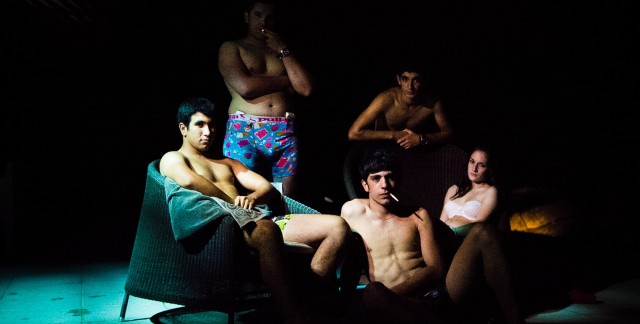
Class distinctions, raging hormones, bad decisions
The title suggests hoodlums or gypsies. Thierry de Peretti examines a local Corsican fait divers in a style that's part neorealism, part noir thriller, and all class inequality, adolescent hormones, and stupid violence. Aziz (Aziz El Hadachi) is a boy from the wrong side of the tracks of Porto-Vecchio, on the south end of the island. One night after an evening drinking and dancing in a disco Aziz takes several buddies and a girl to invade the unoccupied vacation home and pool where his father does maintenance. They swim, drink liquor, and make a mess. One, the chubby Jo (Joseph-Marie Ebrard) gets sick and throws up on the furniture. They also steal a handful of things, including a hi-fi that the Madame later says "wasn't new." The one valuable item is an antique rifle with engraved handle.
The owners of the house turn up pretty soon. When they find the damage the don't call the cops but refer to local gang boss Bati (Michel Ferracci), who traces the break-in back to Aziz and his father. Peretti is knowledgeable, astute, and subtle in his seemingly desultory examination of what the boys do, which leads up to senseless violence. Peter Debruge, chief international film critic of Variety, is not far off the mark when he writes "If Larry Clark went to the French island of Corsica and made a film, it might look an awful lot like 'Les Apaches.'” Very true. The boys are always taking their shirts off, particularly the more chiseled ones. Two of the slimmer ones are sharp dressers, one has a girlfriend who works in a hotel but is more ambitious than her boyfriend, who doesn't want her to go to Juan les Pins for a seasonal job. She says she'll get back to him when he develops some ambition, and his reply is "I'd rather be dead."
Aziz confesses to the other (minor) thefts and returns the items. François-Jo (François-Joseph Cullioli) trns out to be more interested in selling the valuable rifle as a springboard to a better life than loyalty to Aziz. What follows is a series of fumbles, and closeups of the individuals involved leading to a senseless murder.
The trouble the boys cause is minor. They return what they stole. The owners aren't much concerned. It's what the boys do to deal with the trouble that makes things much, much worse. De Peretti wisely doesn't resolve anything, which contributes to the sense of neutrality and realism. He studiously works his documentary vein -- until the end when rather than pumping up the Larry Clark sensualism, he slips into early Coen brothers territory, only to slip away again, with a final ironic tableau underlining just how close to invisible the French-Moroccan boys are to the wealthy vacation population. The irony is tinged with sadness and wisdom.
The young actors, all newcomers, are fully committed, able, and well cast. This is too modest and unwilling to resolve anything to be either a great film or a commercial one but it works its little vein of detached realism well enough to leave a haunting memory or two amid scenes that may seem too familiar. An outstanding sequence comes late when three boys are driving down a country road in a truck. Background sound is ominous and the camera, instead of coming closer, draws away, conveying a sense of events unfolding outside control or good sense.
Les Apaches, 82mins., opened at Cannes in Directors' Fortnight, May 2013, and was released theatrically in France 14 Aug. with moderately good reviews (Allociné press rating: 3.4) and it was still playing occasionally at MK2 Beaubourg in Paris in October. This is De Peretti's second feature. Screened for this review as part of the Univrance-Film Society of Lincoln Center Rendez-Vous with French Cinema for 2014 (6-16 March). Public showtimes:
Monday, March 10, 12:00pm – EBM; Tuesday, March 11, 6:30pm – WRT; Wednesday, March 12, 7:00pm - IFC
In Person: Thierry de Peretti
Last edited by Chris Knipp; 01-01-2015 at 01:02 PM.
-
EASTERN BOYS (Robin Campillo 2013)
ROBIN CAMPILLO: EASTERN BOYS (2013)
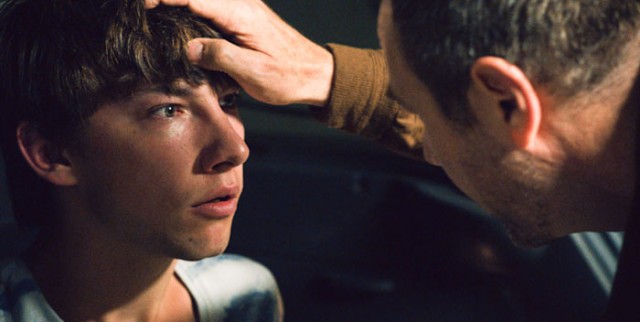
KIRIL EMELYANOV AND OLIVIER RABOURDIN IN EASTERN BOYS
Man and boy
When a gay man takes a very young lover there may inevitably come the point when he becomes a father figure, boyfriend morphing into adopted son. This is heightened in Robin Camillo's excellent French film Eastern Boys because the boy, at first just sex-for-hire found in Paris' Gare du Nord, is a penniless orphan and refugee from Ukraine via Chechnya. And that's further complicated -- and this is what takes Campillo's film out of the confines of a gay niche -- when the boy is controlled by a kind of junior Eastern Mafia boss, getting out of whose clutches is no easy task, and leads the film into thriller territory.
Eastern Boys may be a little bit, even half an hour, too long at two hours and eight minutes. But to compensate it develops each of its independent four chapters in rich, leisurely detail. There are at least three sustained sequences that are very well done. Campillo is known for working with Laurent Cantet, who's no stranger to sex-for-hire themes, but his blend of love story and crime story slips into the realm of Jacques Audiard. The film's early scenes make clear what the Gare du Nord is like, its intermingling of hustlers of various kinds and travelers, by showing it often from above. Amid the patterns of figures in the milling crowd there are about a dozen youths (the "Eastern Boys") with their slightly bigger, slightly more muscular boss, actually known as "Boss" (the dynamic and scary Daniil Vorobyov). Among them wanders a sad-faced, well-dressed Frenchman, Daniel (Olivier Rabourdin of Of Gods and Men). The figures speed up and leave the station when groups of cops appear. Eventually the boy Daniel is interested in, who says his name is Marek (the dreamy, faun-like Kirill Emelyanov), dives under a stairway where he and Daniel, speaking English, arrange a meeting for sex the next evening. Foolishly, Daniel gives Marek his address.
The first and most flashy set piece and the second chapter (of four) is the home invasion that results. Boss and many of his young gang arrive (including later on Marek) with a large van and, while partying and dancing -- especially Boss, who flirts and shows off his muscles - they strip Daniel's cool modern Montreuil highrise apartment of many of its valuables, TV, stereo, computer, paintings, modern chandelier. This spectacular sequence, handsomely filmed by dp Jeanne Lapoirie, shows off the complex dynamics of the Slavic youth gang and its victim's ambivalence. He is aghast but also turned on, and while he momentarily objects (which Boss won't tolerate) he also drinks and for a while dances with the revelers, who use the pretense of a party with loud music to cover their thefts.
Daniel's passivity is softened by his comfortable circumstances. It's not specified what he does but when he dresses and goes off in a suit the next morning leaving his stripped-down flat for the maid to clean up, we assume it's to a very well-paying job. And so he can replace things. Maybe it was time for a do-over. Surprisingly, not long later Marek comes back to the door, all by himself this time, ready to perform sex for the amount originally agreed upon, and surprisingly also, Daniel agrees.
This begins another sequence (and chapter) in which the relationship between Daniel and Marek, who reveals his real name is Rouslan, begins developing. Marek-Rouslan calls and arranges to come back again, and his visits become regular, several times a week. Here by taking his time Campillo is able to show the subtle shift from pure sex to reciprocation and some affection, with the boy just receiving at first, then being stimulated (the scenes are graphic, but not too). Marek is cold and passive, but he starts to care a bit. This leads to a deal, and purchases, and suspicion from Boss, who won't tolerate any one of his boy gang having too much independence. They have passports, but Boss keeps them in a "safe" (a locker) in a remote hotel called Halt where the boys all live together as arranged by Social Services but not fully registered with the hotel management represented by an officious and energetic young black woman (Edéa Darcque).
As the relationship between Daniel and Rouslan grows, good use is made of Rouslan's halting, but still eloquent French (in which he now becomes pretty fluent), where simple, repetitive phrases ("You do not trust me. You do not believe me. You do not care about my father's death," etc.) takes on occasionally (in scenes in a supermarket and back in the flat) an almost poetic quality that recalls the Japanese lover in Resnais' Hiroshima mon amour. (Marguerite Duras was an expert on very young lovers too.) Rouslan, like Emmanuelle Riva's character, has a traumatic war in his past that his lover doesn't understand. This is dramatized in a 14 juillet sequence when Rouslan is terrorized by distant fireworks.
All this leads to the last chapter, entitled "Dungeons and Dragons," which introduces the thriller element, as Daniel seeks to save Rouslan from the prison he's in and become truly his protector. Here Campillo shows he can stage not just group set pieces, and one-on-one relationship stuff, but also ensemble action. The accomplishment of the film is that each of these different chapters comes as a natural transition even though it's unexpected.
Eastern Boys, 128 mins., debuted at Venice in the Orizzonti section, where it won the jury prize. It is scheduled for French theatrical release 9 April 2014 (well received: AlloCiné press rating 3.8). It was screened for this review as part of the Unifrance-Film Society of Lincoln Center's 2014 Rendez-Vous with French Cinema (6-16 March). for public showings March 11 and 12, 2014. Later scheduled for theatrical release 27 February 2015. Armond White reviewed it for Out: "the sex scenes of the year—offering several shades of empathy."
This review was also published on Cinescene.
Last edited by Chris Knipp; 02-02-2024 at 12:08 PM.
-
TONNERRE (Guillaume Brac 2013)
GUILLAUME BRAC: TONNERRE (2013)
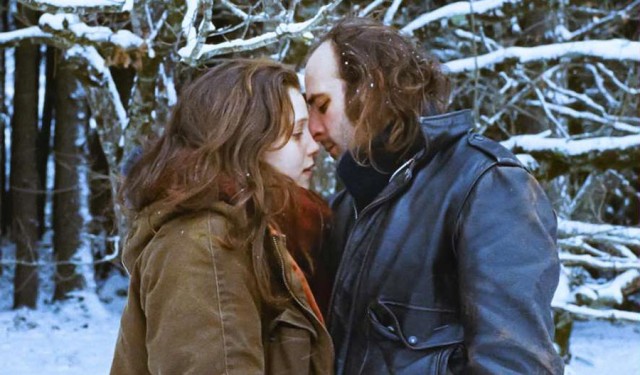
SOLÈNE RIGOT AND VINCENT MACAIGNE IN TONNERRE
Romantic loser
French cinema-of-the-thirty-something "it" boy Vincent Macaigne agains shows his emotional versatility and conviction in embodying an amiable loser in Guillaume Brac's feature film debut Tonnerre. Brac and Macaigne teamed up for the medium-length film World Without Women previously. The film is named for the small Burgundian town Brac knows well from visiting his grandparents there. The cinematography has an attractive grey sparkle from the snow-coverdd locales of the wintter 2012-2013 shoot in Burgundy and the Morvan. Macaigne has four feature credits for 2013, and three of them (the other two are Age of Panic/La bataille de Solférino and 2 Augumns, 3 Winters) are included in New York's Rendez-Vous with French Cinema 2014 edition. Though lightweight and somewhat tonally uneven, Tonnerre does have some surprises.
Maxime (Macaigne) is a fairly well-known rocker who goes back to live with his father Claude in the titular village. Has he done this because he loves the peace and quiet and finds it more conducive than Paris to composing songs -- which he prefers to do solo, adding instruments and musicians later? Or was it more because his success and ambition have both begun to fade? Anyway a local journalist, Mélodie (Solène Rigot), evidently an admirer, comes to interview him and after meeting a couple of times Mélodie and Maxime embark on a romantic affair. But very soon, on the pretext of a short trip, Mélodie disappears without explanation. Maxime becomes frantic, then despairing, then desperate. A very nasty unsigned text message comes to Maxime calling him a "pedophile." An old friend has lent him a pistol. . . Maxime tracks Mélodie to her ex-boyfriend Ivan (Jonas Bloquet), whom we've already glimpsed, a tall, trim, handsome, blue-eyed, blond soccer player, who, incidentally, is Mélodie's age. Maxime is a scruffy-haired, balding schlub a decade or so older. Tough competition? Is this to be the revenge of the schlubs? Or an acting out of thirty-something angst?
In the event, Maxime's obsession leads to a scene in a parking garage that's straight out of a crime thriller. A strange idyl is interrupted by an invasion of cops. The resolution seems hurried and a bit fantastic. It's also unclear, both where things are going to go at the film's end and what was actually going on in Mélodie's mind, or what her relationship with Ivan was, exactly. That's too many fudges. There is a sort of subplot of Claude, who had a "story" with a much younger woman decades before. Does going after younger women run in the male line? But is the age difference really so significant in Maxime's case -- or is the problem all due to Mélodie?
Brac deserves credit for risking the genre twists, despite the tonal unevenness that causes. It may all which work better in the magical wintry locales. But plot and characters are underwritten. Hence it's hard to feel very involved. Maxime's musical identity isn't convincing, and it's hard to see why either Ivan or Maxime would go ape over Mélodie. Some use of local non-actors works and some doesn't. One winemaker's bizarrely inappropriate lewdness combines whimsy with bad taste. Nonetheless Brac shows some indie promise here, after all. His eccentricity seems unlikely to play well for an international audience yet: maybe next time.
Tonnerre , 102 mins., debuted at Locarno and showed at other festivals. It was released theatrically in France 29 January 2014 and received generally favorable reviews (Allociné press rating: 3.6). Screened for this review as part of the Unifrance-Film society of Lincoln Center Rendez-Vous with French Cinema (6-16 March 2014). Public screenings in the series:
Wednesday, March 12, 4:00pm – WRT; Thursday, March 13, 7:00pm – IFC; Friday, March 14, 6:30pm - WRT
In Person: Guillaume Brac
Last edited by Chris Knipp; 01-01-2015 at 01:09 PM.
 Posting Permissions
Posting Permissions
- You may not post new threads
- You may not post replies
- You may not post attachments
- You may not edit your posts
-
Forum Rules





 Reply With Quote
Reply With Quote






Bookmarks